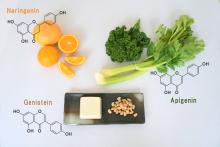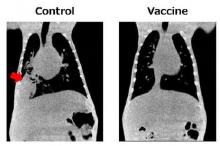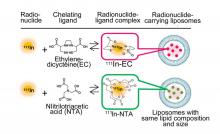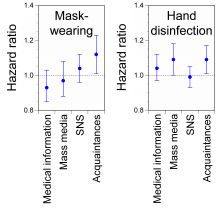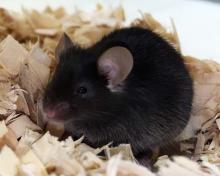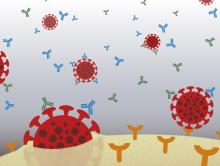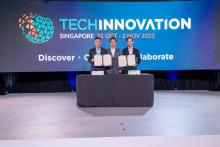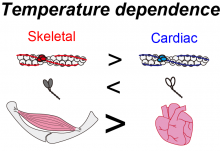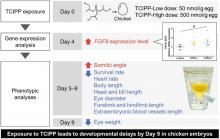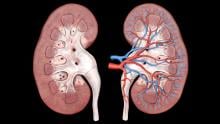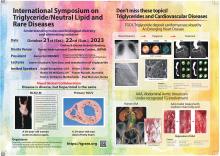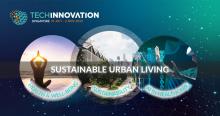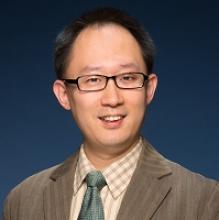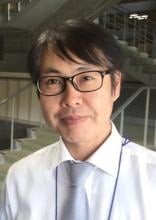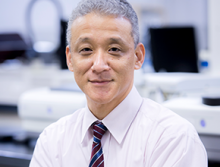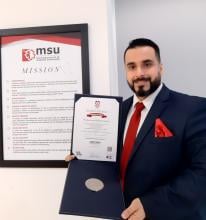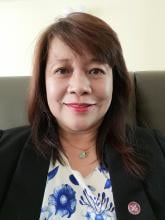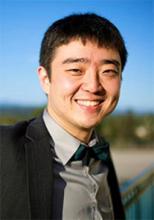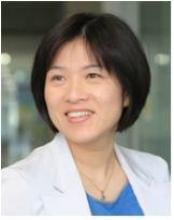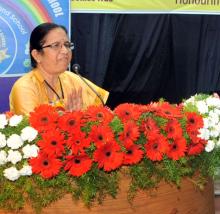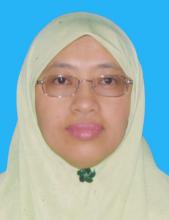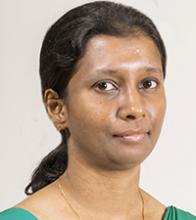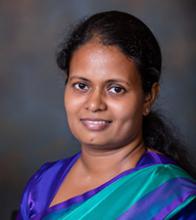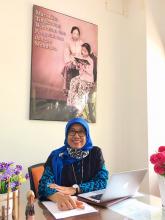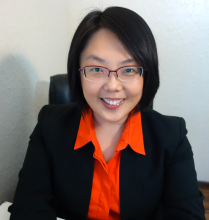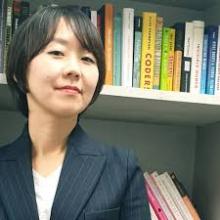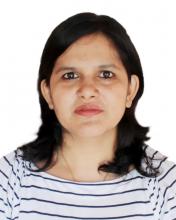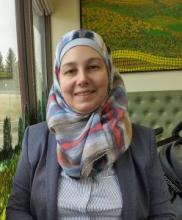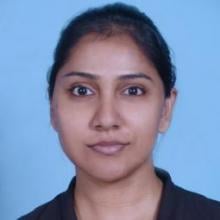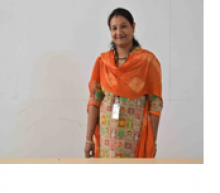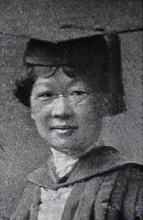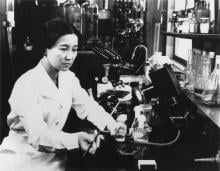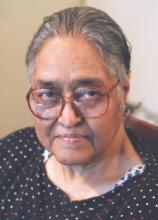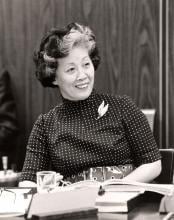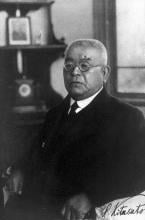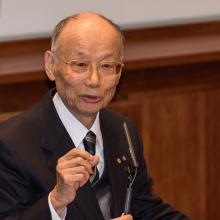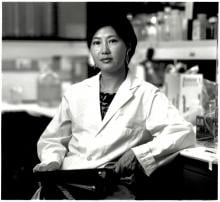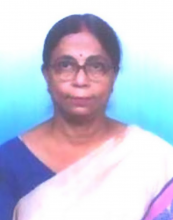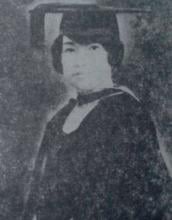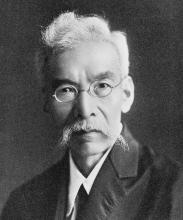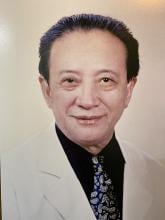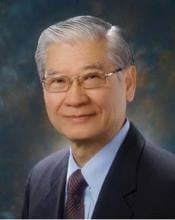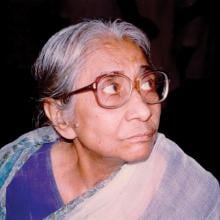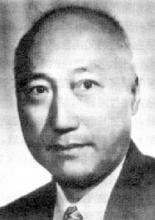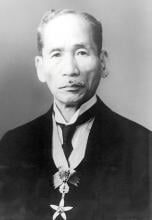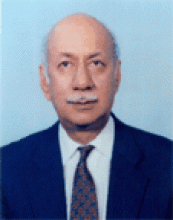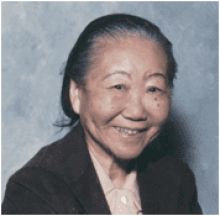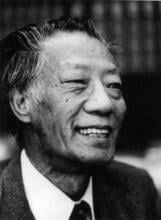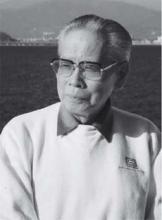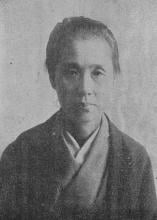Health
News
30 Nov 2023
An international team of researchers led by Osaka Metropolitan University has elucidated the process by which the major flavonoids naringenin, apigenin, and genistein are metabolized in the body. These findings are fundamental in elucidating the correlation between the metabolism of flavonoids in the body and their potential health benefits.
27 Nov 2023
A research team from Osaka Metropolitan University has successfully developed a novel pneumococcal vaccine by combining the team’s proprietary mucosal vaccine technology with pneumococcal surface proteins that can cover a wide range of serotypes. Experiments were conducted using mice and macaques and it was confirmed that pneumonia caused by pneumococcal infection was clearly suppressed in the target groups of animals inoculated with the vaccine.
24 Nov 2023
Asia Research News monitors the latest research news in Asia. Some highlights that caught our attention this week are screentime changing children’s brains, a bacterium that can help reduce toilet time, and a reproductive strategy that is definitely not the butt of the joke.
21 Nov 2023
Researchers develop new method suppressing the distribution of drugs to healthy tissues, but also to rapidly removes the drugs once distributed in the body, which could improve the accuracy of imaging diagnosis of difficult cancers, reduce toxicity to healthy tissues, and furthermore improve the effectiveness of treatment.
17 Nov 2023
Asia Research News monitors the latest research news in Asia. Some highlights that caught our attention this week are sea cucumbers that glow in the dark, a needle that softens at body temperature, and the real size of our sun.
17 Nov 2023
Researchers from Osaka University found that Japanese people who used medical information were more likely to wear masks and disinfect their hands even before the COVID-19 outbreak, while those who exchanged information with acquaintances were more likely to newly start mask-wearing and hand disinfection post outbreak. This will assist in the development of risk communication strategies to promote infection-preventive behavior in a timely manner.
17 Nov 2023
Analysis of more than 80,000 diabetes patients in Singapore links elevated systolic pressure and very low diastolic pressure to higher cardiovascular mortality. Underscores need to control high systolic levels while exercising caution with low diastolic levels.
16 Nov 2023
The winners of the Applied Microbiology International Horizon Awards were announced at the prestigious Environmental Microbiology lecture 2023, held at BMA House in London on November 16.
14 Nov 2023
Cancer stem cells cause the aging of macrophages in mice with healthy immune systems, creating conditions for the formation of tumors.
13 Nov 2023
New study finds prior dengue antibodies substantially raise risk of microcephaly, foetal defects with Zika infection.
10 Nov 2023
Asia Research News monitors the latest research news in Asia. Some highlights that caught our attention this week are how mice help disperse seeds of a centennial blooming plant, a new isle created by recent volcanic activity, and how organisms breaking up microplastics is not always a good thing.
10 Nov 2023
New insights on how individual immune responses to the SARS-CoV-2 virus, particularly in mutant strains, can influence the efficacy of COVID-19 vaccines
09 Nov 2023
New shrimp species in ancient hot spring, Super sprouts, How "warm-ups" work, New antiviral candidate, Solving voltage decay and from our blog: A sustainable future shines in TIE 2023. Read all in the latest Editor's Choice.
07 Nov 2023
SINGAPORE, November 7, 2023 – TechInnovation 2023, IPI's flagship event and a premier technology-matching platform, successfully concluded on Thursday, 2 November 2023, profoundly impacting audiences with insights into Sustainability, Health & Well-being, and AI in Healthcare. Over 5,000 people registered to attend TechInnovation, which brought together industry leaders, innovators, and technology experts alike to share and discover opportunities to partner and collaborate to create a sustainable future.
02 Nov 2023
Asia Research News monitors the latest research news in Asia. Some highlights that caught our attention this week are mouse embryos grown on the International Space Station, a super-efficient micro engine, and how a virus can help deaf children hear.
02 Nov 2023
Collaborations with seven key local partners aim to strengthen capabilities for integrated care for the “super-aged” society
27 Oct 2023
Asia Research News monitors the latest research news in Asia. Some highlights that caught our attention this week are parasites that borrow their hosts genes, how waste feathers can be used in hydrogen fuel cells, and a poor bird that was caught up in a powerful typhoon.
24 Oct 2023
Research out of Osaka University investigated the effect of increased cell temperature on the contractility of skeletal muscle and cardiac muscle by heating the muscle proteins using advanced microscopical techniques. The findings indicated that skeletal muscle is more sensitive to increases in temperature than cardiac muscle, and that heating can rapidly activate the contractile proteins of skeletal muscle, thereby improving muscle performance.
20 Oct 2023
Evaluation of developmental toxicity in early chicken embryos exposed to tris(2-chloroisopropyl) phosphate

20 Oct 2023
This study examined how the origin (wild or hatchery-reared), feeding area (Baltic Sea mainstem, Bosnian Sea, and Gulf of Finland), and organic halogen compound (OHC) concentrations of Baltic Sea Atlantic salmon (Salmo salar) affect the salmon liver proteome, transcriptome, and oxidative stress markers. Results suggest that the Baltic salmon liver proteome, together with the transcriptome, is influenced more by OHC concentrations and oxidative stress levels in the feeding area than by their origin.
20 Oct 2023
Structural characteristics of environmental pollutants and computer simulations predict effects on the endocrine system of seals
20 Oct 2023
New perspective argues pursuing fair AI for healthcare requires cross-disciplinary collaboration to translate methods into real-world benefits.
16 Oct 2023
New research reveals how disrupted energy production in the kidneys contributes to progressive kidney disease in diabetes.
13 Oct 2023
Asia Research News monitors the latest research news in Asia. Some highlights that caught our attention this week are radiation blasts that come from outer space, a new way of seeing the Earth’s core, and a prosthetic socket that fills in the gaps.
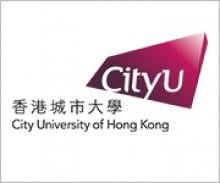
12 Oct 2023
Chemotherapy for cancer treatment often results in collateral damage to healthy cells and other adverse effects. A research team led by City University of Hong Kong (CityU) recently developed “sono-sensitised chemotherapy” (SSCT), a new form of ultrasound-activated chemotherapy, which further enhances the precision for eradicating deeper tumours with centimetre range of tissue penetration and minimises side effects.
11 Oct 2023
A research team led by Osaka University developed a theranostics approach to both diagnose and treat certain pancreatic cancer cases. They radioactively labeled a monoclonal antibody targeting glypican-1, which is highly expressed in pancreatic cancer, then administered it to disease model mice. One label, 89Zr, showed high uptake in tumors, which would allow early detection of pancreatic cancer with PET scans. Another label, 211At, was used with alpha therapy to significantly slow tumor growth.
11 Oct 2023
The International Symposium on Triglyceride/Neutral Lipid and Rare Diseases will be held at the Kyoto International Conference Center on October 21 and 22, 2023. The symposium is organized by the International Symposium on Triglyceride/Neutral Lipid and Rare Diseases Conference Committee, which is led by Dr. Ken-ichi Hirano (Graduate School of Medicine, Osaka University) and the Japan Intractable Diseases (Nanbyo) Research Foundation.
10 Oct 2023
Asia’s premier technology-matching platform returns for its 11th edition from 31 October to 2 November at Marina Bay Sands.
05 Oct 2023
Hunting for supermassive black holes, Coastal survival at risk, Calcium and dead cell clean-up, Two naps are better than one & Pineapple leaf prosthetics. Read all in the latest Editor's Choice.
05 Oct 2023
The finalists in the Applied Microbiology International Product of the Year Award 2023 have been announced. The awards promote the research, groups, projects, products and individuals who are shaping the future of applied microbiology.
Events
Sorry, no events coming up for this topic.
Researchers
Hiroshima University
Yohei Kawano is currently and Associate Professor at the Department of Immunology, Graduate School of Biomedical and Health Sciences, Hiroshima University.
Hiroshima University
Prof. Kiyomi Shitaoka's research aims to obtain effective antibody genes and T cell receptor genes by single-cell analysis of B cell and T cell receptors on lymphocytes. In addition, to apply these genes to develop new treatments for overcoming infectious diseases and cancer.
Duke-NUS Medical School
Semra Ozdemir is an Assistant Professor at Lien Centre for Palliative Care and the Signature Programme in Health Services and Systems Research, Duke-NUS. Her main research areas are medical decision making and health economics
Hong Kong Baptist University (HKBU)
Dr. Ken is currently an assistant professor in the department of Chemistry at HKBU. His current research interests center on advanced analytical chemistry technologies, with particular emphasis on creating and applying novel instrumental analysis technologies based on microfluidics and materials engineering.
Hiroshima University
Prof. Tomoharu Yasuda's laboratory studies how immune system is regulated through the antigen receptor, intracellular signaling and lymphocyte programming.
Dr Yuichi Ohya’s research fields are functional polymers and biomaterials, especially biodegradable polymers and drug delivery systems.
Monash University
Dr Yap is currently a senior lecturer and course coordinator for the Bachelor of Medical Bioscience at Monash University Malaysia. She is dedicated to toxin pharmacology and toxicology research. She has strong background in biomolecular modelling, proteomics, immunological and molecular pharmacology of bioactive toxins. She leads the Toxin Pharmacology Research Group. Her research group now focuses on molecular mechanisms of cytotoxin with the ultimate goal of developing next-generation biotherapeutics. Her research works have been featured in prominent media outlets, including the International Snakebite Awareness Day campaign. Besides active in research, she is also an education innovator who adopts various active learning strategies with technology. She teaches undergraduate units with an emphasis on student-cantered learning using the andragogy approach. Dr Michelle enjoys promoting STEM education to the public. She has organized and hosted several workshops and forums to advance the disciplines in medical sciences through research and education.
Dr. Indika Neluwa-Liyanage is a lecturer in Biochemistry at the Faculty of Medical Sciences of University of Sri Jayewardenepura. His research focuses on the metabolic alterations underlying autism spectrum disorders and inherited metabolic disorders.
Dr. Mohammed N. Abdulrazaq is currently an Assoc. Prof. at Department of Engineering & Technology, Management & Science University (MSU), Malaysia.
Universiti Malaysia Sabah
Dr. Connie Cassy Ompok is an early childhood education expert and a Senior Lecturer at the Faculty of Psychology and Education, Universiti Malaysia Sabah. She Started her career in Early Childhood Education as a preschool teacher (2004-2007), a lecturer in early childhood education at the Malaysian Institute of Teacher Education (2008-2016) before serving as a Senior Lecturer in Early Childhood Education at UMS (2016 until now).
University of Malaya
Assoc Prof Dr Loh Siew Yim is a senior lecturer at the faculty of Medicine in University of Malaya, Malaysia
Her research interest is cancer survivorship, and behavioural medicine .
Earth-Life Science Institute (ELSI), Tokyo Institute of Technology
Tony Z. Jia is a researcher at Japan’s Earth-Life Science Institute (ELSI), based at the Tokyo Institute of Technology. His research focuses on astrobiology, prebiotic chemistry, and origins of life.
Ulsan National Institute of Science and Technology (UNIST)
Yoon-Kyoung Cho is currently a group leader in the Center for Soft and Living Matter at the Institute for Basic Science (IBS) and a full professor in the Department of Biomedical Engineering at Ulsan National Institute of Science and Technology (UNIST) in the Republic of Korea.
Prof. Khader has spent more than 30 years researching economic empowerment of Rural, Farm, Fisher and Tribal Women. Gender aspects underpins her research on livelihoods, food and nutrition security, growth and well-being of community.
University of Malaya
The Neuroscience Research Group is a multi-disciplinary team investigating the nervous system. They are focusing on animal behavioral models for memory in the laboratory. They are studying the effects of food, such as Habbatus Sauda/Black cumin (Nigella sativa) and honey, on brain microstructures and memory. They also compare Islamic and neuroscience perspectives on issues like learning and sleep for children with and without autism spectrum disorders.
Priyanka Jayawardena is a Research Economist with research interests in skills and education, demographics, health, and labour markets. Priyanka has around 15 years of research experience at IPS. She has worked as a consultant to international organisations including World Bank, ADB and UNICEF. She has conducted numerous research studies relating to the human resource development in Sri Lanka for a variety of development partners and various government ministries. Her research has been published in peer reviewed national and international journals and book chapters. She holds a BSc (Hons) specialised in Statistics and an MA in Economics, both from the University of Colombo.
Sunimalee’s research interests include health economics, gender and population studies. She holds a BA (Economic Special) degree with a first class and a Masters in Economics (MEcon) degree from the University of Colombo, Sri Lanka.
A Tenured Professor at the Institute of Space Technology (Pakistan), Dr. Shabbir is working on Polymer based Nanomaterials for water treatment, food safety, nano-drug delivery systems, solar cells and carbon dioxide capture.
Duke-NUS Medical School
Eric Finkelstein is a Professor of the Programme in Health Services & Systems Research and the Executive Director of the Lien Centre for Palliative Care at the Duke-NUS Medical School, Singapore. He also holds appointments at NUS School of Public Health and Duke University Global Health Institute.
My current research is generally on the bioactive compounds, antioxidant and antimicrobial properties especially from agricultural by-product. Recently, I have found that these agricultural by-product has a promising potential to be used as biopesticide. They are not expensive, practical and will not significantly affect the environment and human health.
Women leadership to support access of sexual and reproductive health issues and stunting for women and youth very important issues in Indonesia as well as violence against women and stop child marriage. Particularly in Indonesia religious issues and culture are important to be stressed in these issues besides government policy.
Nanyang Technological University
The prospect of favorably influencing brain health through dietary habits has gained much interest. My research interest explores the therapeutic potential of functional foods and phytonutrients as neuroprotectants against mitochondrial diseases and cerebral toxoplasmosis. The scientific findings support nutritional intervention as a viable strategy for the management of human brain disorders.
National University of Singapore
I work at the intersection of Business, Medicine and Environment. Many of the world’s current problems are best addressed from multiple perspectives. I examine issues ranging from sustainable development, pandemics, diversity, environment, social innovation and philanthropy, and suggest how we can do better.
I am an Assistant Professor in Health Services Policy and Management at the University of South Carolina Arnold School of Public Health, US. As a health services researcher and a rural health advocate, I am driven to advance rural health equity via productive, insightful research collaborations. My work applies global and hyper-local perspectives (rural-urban, county-level, state-level variations) building statistical models to examine rural healthcare delivery on outcomes, access, and welfare of women.
So Yeon Leem is a professor at Sookmyung Women’s University, South Korea, and an expert in Women in STEM and cosmetic surgery practices in the country.
Ms. Mira Adhikari is a nursing faculty member on Pokhara Nursing Campus, Institute of Medicine, Tribhuvan University, Nepal. She has a rich experience of over 15 years in this profession.
Dr. Mais Aljunaidy is an expert in women's mental health and an instructor at the Department of Psychology, Bilkent University, Turkey.
1. An Applied Statistician and Operation Research specialist with 35 years of
experience in academic teaching, corporate consultancy, and professional
training.
2. Conducted sessions for women and senior citizens on mental health and coping skills.
3. An awardee of the Statistical Capacity Building award by the World
Bank.
4. Published technical articles in reputed journals as well as authored books and book chapters
5. Published author with nearly 3600 articles in leading newspapers and magazines in India.
Nimanthi Jayathilaka is a professor at the Department of Chemistry, University of Kelaniya, Sri Lanka.
Dr. Mamta Agrawal
BSc. (Maths, Physics, Chemistry), MSc. (Mathematics),
DCA (Diploma in computer applications)
MCA (Masters in computer applications)
PHD (Mathematics and Computational Biology)
POST DOC (Mathematics and Computational Biology)
completed two research projects: 1. WOS-A (DST New Delhi) 2. Indo-Austria research Projuect (DST-BMWF)
Visited Abrod four countries Thiland, South Korea, Austria, Nepal
Paper Pulication-18
ChpterPublication-1
Book Publication-1
Patent- going on
Giants in history
Chinese biochemist Chi Che Wang (1894 - 1979), one of the first Chinese women to study abroad, advanced to prominent research positions at American institutions including the University of Chicago and the Northwestern University Medical School.
Ruby Sakae Hirose (1904 – 1960) was a Japanese-American scientist whose research contributed significantly to our understanding of blood clotting, allergies and cancer.
Flora Zaibun Majid ( 1939–2018) was an accomplished Bangladeshi researcher in botany and nutrition science and the first female chairperson of the Bangladesh Council of Scientific and Industrial Research.
Iranian physician and bacteriologist Azar Andami (8 December 1926 – 19 August 1984) developed a cholera vaccine to combat an outbreak that swept through the Middle East, India, Southeast Asia, and Africa in 1937.
Irene Ayako Uchida’s (8 April 1917 – 30 July 2013) strides to understand genetic diseases such as Down syndrome paved the way for early screening of chromosomal abnormalities in foetuses.
Baron Kitasato Shibasaburo (29 January 1856 – 13 June 1931) was a Japanese physician and bacteriologist whose work led to a new understanding of preventing and treating tetanus, diphtheria and anthrax.
Maggie Lim (5 January 1913 – November 1995) was a Singaporean physician who promoted family planning and expanded the access to clinics to improve the quality of life for mothers and children in Singapore’s early days.
By isolating soil microorganisms and studying the compounds they produce, Satoshi Omura (born 1935) discovered almost 500 organic compounds with unique properties that were produced by these microorganisms, including many new antibiotics.
The founder of the Adyar Cancer Institute in India, Muthulakshmi Reddy (30 July 1886 – 22 July 1968), fought to uplift women and girls from impoverished situations.
Chinese-American virologist and molecular biologist Flossie Wong-Staal (27 August 1946 – 8 July 2020) was the first scientist to clone HIV and determine the function of its genes.
Maharani Chakravorty (1937 – 2015) was one of India’s earliest molecular biologists whose research paved the way for advances in the treatment of bacterial and viral infections.
Archana Sharma (16 February 1932 - 14 January 2008) conducted research into plant and human genetics that expanded the understanding of both botany and human health. In relation to botany, she uncovered the means by which asexually-reproducing plants evolve into new species.
The first Thai woman to receive a degree in medicine, Margaret Lin Xavier (29 May 1898 – 6 December 1932), is best remembered for her compassion towards her less privileged patients.
In 1915, pathologist Katsusaburo Yamagiwa and his research assistant Koichi Ichikawa became the first to prove that chronic exposure to chemicals can cause cancer.
Filipino chemist and pharmacist Manuel A. Zamora (29 March 1870 – 9 July 1929) is best remembered for his discovery of the tiki-tiki formula to combat beriberi, a disease caused by Vitamin B1 deficiency.
After witnessing death and suffering as a youth in his home village during World War II, Nguyễn Tài Thu (6 April 1931 – 14 February 2021) set his sights on alleviating pain by becoming a doctor. After studying Traditional Chinese Medicine in China in the 1950s, Thu returned to Vietnam to serve in military hospitals. Eventually, he became the country’s foremost practitioner of acupuncture, a technique he first learned by inserting needles into himself.
David T. Wong (born 1936) is a Hong Kong-born American neuroscientist who is best known for discovering the antidepressant drug fluoxetine, better known as Prozac.
Indian organic chemist Asima Chatterjee (1917 to 2006) studied the medicinal properties of plant products, especially compounds known as vinca alkaloids.
Hsien Wu (24 November 1893 – 8 August 1959) is widely regarded as the founder of biochemistry and nutrition science in China. He was the first to propose that protein denaturation was caused by the unfolding of the protein, instead of chemical alteration.
Umetaro Suzuki (7 April 1874 – 20 September 1943) was a Japanese scientist best remembered for his research on beriberi, a disease caused by vitamin B1 deficiency, characterized by limb stiffness, paralysis and pain.
Syed Qasim Mehdi (13 February 1941 – 28 September 2016) was a Pakistani molecular biologist who was a founding member of the Human Genome Diversity Project (HGDP), which assessed human diversity by studying human migration, mutation rates, relationships between different populations, genes involved in height and selective pressure.
Tsai-Fan Yu (1911 – 2 March 2007) was a Chinese-American physician and researcher who was the first female full professor at Mount Sinai School of Medicine. She discovered that gout, a condition characterized by the painful inflammation of joints, was caused by elevated levels of uric acid in the bloodstream.
Min Chueh Chang (10 October 1908 – 5 June 1991) was a Chinese-American biologist who studied fertilization in mammalian reproduction.
A Japanese surgeon, Tetsuzo Akutsu (20 August 1922 – 9 August 2007) built the first artificial heart capable of keeping an animal alive.
Ogino Ginko (3 March 1851 – 23 June 1913) was the first registered female doctor to practise modern medicine in Japan.


